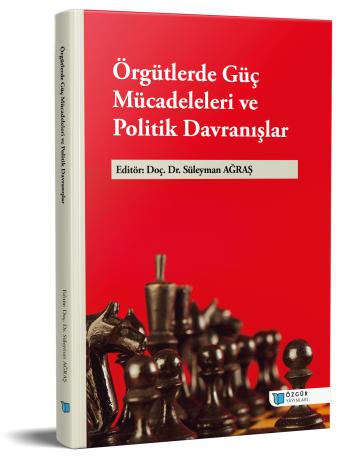
The Foundations of Political Behaviour in Organisations
Chapter from the book:
Ağraş,
S.
(ed.)
2025.
Power Struggles and Political Behaviours in Organizations.
Synopsis
Political behaviour, an inevitable phenomenon inherent to organisational life, is defined as the deliberate actions undertaken by individuals and groups to gain, maintain, or enhance power in contexts characterised by scarce resources, diverse objectives, and differing interest groups. This study provides a comprehensive examination of the theoretical foundations of political behaviour, its underlying causes, its interplay with organisational dynamics, and its consequences. In organisational environments where resources are limited, uncertainty prevails, and power relations are fluid, political behaviour extends beyond individual interest strategies, becoming an integral component of organisational functioning and decision-making processes. The first section of this study defines political behaviour and distinguishes it from the concept of organisational policy. Organisational policies refer to the formal rules and procedures governing an organisation’s structure and operations, whereas political behaviour encompasses the strategic actions individuals and groups engage in to pursue their interests within or around these rules. This distinction is crucial for understanding both the institutional and individual dimensions of political processes. The factors influencing political behaviour are examined from multiple perspectives. Institutional elements, including organisational structure, culture, and hierarchy, shape the nature of political behaviour. Individual characteristics, such as personality traits, values, motivation, and political skills, guide the direction of these behaviours. Environmental conditions, including competition, uncertainty, economic pressures, and external demands, also directly impact organisational political processes. From a theoretical standpoint, this study contrasts classical and contemporary approaches. While classical theories provide foundational models for explaining political behaviour, contemporary frameworks emphasise its complex, multi-layered nature, highlighting that political behaviour emerges not only in interpersonal interactions but also across inter-organisational levels, such as coalitions, alliances, lobbying, and regulatory engagements. This study further examines both the positive and negative aspects of political behaviour. Functional political actions can enhance leadership effectiveness, foster innovation, and promote cooperation, whereas dysfunctional political actions are characterised by manipulation, gossip, unfair resource allocation, and sabotage. Empirical findings indicate that political behaviour manifests in both functional and dysfunctional forms, exerting a significant influence on organisational performance, trust climate, and adaptability. The literature underscores that political behaviour is an unavoidable aspect of organisational life, yet when effectively managed, it can yield positive outcomes. Strategies to mitigate negative political behaviour include promoting ethical conduct, reinforcing transparency and justice mechanisms, and implementing effective leadership alongside open communication practices. Although political behaviour cannot be entirely eliminated, emphasising its functional dimensions while controlling its destructive consequences is critical for enhancing organisational effectiveness.

